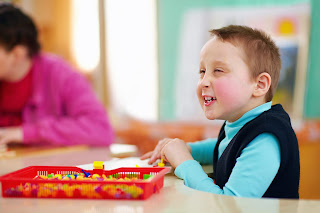The day when you become a parent is one of the best of your life. You feel overjoyed when your child starts walking, talking, and responding to your love. But what would you do if your child responds, talks, and behaves in a different manner than you would generally expect? You might get overwhelmed and rush to your doctor to find out what’s going wrong. If the doctor diagnoses your child with autism, you may feel confused and shocked. Autism is chronic, meaning you will have to alter your parenting to benefit your child for life.
Don’t let autism take charge
The positive side to an autism diagnosis is that your actual
parental role has just begun, maybe in a new form. It’s time for you to revise,
modify, and adapt to a new situation while keeping your goals intact. Remember
that autism diagnosis is just the beginning of a new long journey for both the
parents and the child. Socialization, language, and the many other problems
that arise with autism can take their toll on your child’s life. Having to see
your child fight these problems might put you in a state of despair and stress.
In this article, we will discuss how you can slowly yet effectively transform
your parental role into a new one.
Take action
Start your new day with a bit of hope and lots of strategies
to help your child cope with the debilitating effects. Here are some tips for
you:
1. Talk to your child slowly and never
let your children stray away from conversation: For a child with autism,
silence is not the best answer. You have to steal a considerable amount of time
from your hectic schedule so that you can talk to your child using clear and
simple sentences. Doing so will help your child learn more about communication
and interaction with other people. Be patient enough to learn to accept that
your child’s response may not meet your expectations on the first try.
2. Take your child out for play: Life in
a box is detrimental for your autistic child. Spending an hour or more in an
external environment keeps your child attached to their surroundings. The child
will also learn to behave properly in response to outside factors like crowds,
noise, and people near you. Think of going for a walk or to a calm park.
3. Take caution but be open to
experiments: Since you are totally unaware of how your child will respond to a
new diet or a new medication, giving them a try (with caution, strictly) with
consultation from your doctor is never a bad idea.
4. Take expert advice: Experts do not
necessarily refer to medical personnel only! Other parents who have been going
through the same phase or those experienced in parenting an autistic child may
be able to give tips. It is however essential to note that all those tips may
not work for your child, as each case is unique.
5. Be your child’s best friend: It’s not
as difficult as you might think. Being your child’s friend is the best way to support
and monitor the behavior and response to specific situations. Friendship allows
more room for your child to express what he or she is thinking or feeling. Once
you get an idea of your child’s thinking, you can design or modify further
strategies more easily. Negligence or ignorance can leave an everlasting
negative impression in the child’s maturing mind. So, do not show your
frustration or anger in front of your child. Stay cool!
In a nutshell, autism diagnosis can be painful, along with
the initial months of parenting. Once you get “used to” and start learning new
ways to cope, things become manageable or at least bearable. Treatment plans
work their best when your child gets supplemental emotional support from
you.
If your child is diagnosed with autism and you want to learn
more about the condition, its effects, or parenting tips, talk to the best
doctors in your town at FindaTopDoc.com. Booking is absolutely free and the service is available 7
days a week/24 hours a day.
